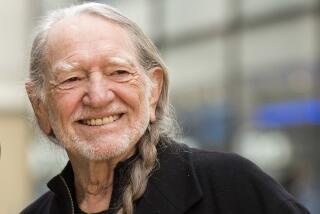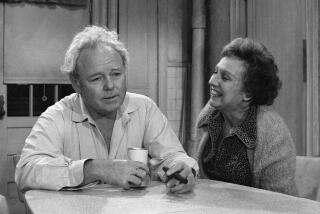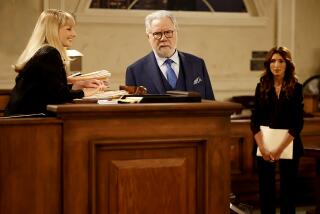The First Family of TV
- Share via
On a Friday night 50 years ago today, amid some anxiety from ABC executives about the show’s appeal, “The Adventures of Ozzie and Harriet” was televised for the first time. They needn’t have worried; it stayed on the air for 14 years, setting a record for the longest-running family sitcom.
It’s a record that will be tied when “The Simpsons” returns to Fox for its 14th season next month. Even if “The Simpsons” beats the longevity record, it’s currently 144 episodes shy of “Ozzie and Harriet’s” 435. Anyway, “Ozzie and Harriet” had been a weekly series on radio for eight years before it jumped to TV. (The radio show continued until 1954.)
Obviously, those numbers reflect one of the most popular shows ever. “Ozzie and Harriet” did not quite invent the family TV sitcom--there were others present at the creation, such as “The Stu Erwin Show,” which aired from 1950 to 1955--but it created the mold for what we think of as “family sitcom,” from which were cast such solid ingots as “Father Knows Best” and “Leave It to Beaver,” right up to such variations on the theme as “Malcolm in the Middle” and, yes, “The Simpsons.”
In addition to its longevity, it also has been one of the most mocked, derided and parodied shows, with comics noting Ozzie’s seemingly invisible job.
He may have been the butt of jokes, but by any measure the most important ingredient in the show’s durable success would have to have been Oswald George Nelson, an extremely savvy and industrious businessman and entertainer. Born March 20, 1906, in Jersey City, N.J., he was an Eagle Scout by age 13. He graduated from Rutgers University, where he was a star quarterback, and attended law school, but he quickly abandoned law for music when the dance band he had formed in college began to enjoy success.
Mix in the next ingredient: Peggy Lou Snyder. Born in Des Moines on July 18, 1909, she took the name Harriet Hilliard when she began in vaudeville. She joined Ozzie’s band in 1932, becoming only the second female vocalist featured in a big band (the first was Mildred Bailey, with Paul Whiteman), and they expanded their success with recordings. She also joined Ozzie in marriage, in October 1935. Their first son, David Ozzie, was born in 1936, followed by Eric Hilliard (Ricky) in 1940.
By this time, the late 1930s and early ‘40s, Harriet, and then both of them, began appearing in movies. By this time too, the touring dance band was in decline. In 1941, the Nelsons moved from New Jersey to Hollywood, where Ozzie became bandleader for Red Skelton’s radio program, on which Harriet sang and played several roles.
The sea change came in 1944: CBS offered the Nelsons their own radio show. On Oct. 8 (the couple’s ninth wedding anniversary), listeners first heard the chirpy, upbeat opening that people who today are of Social Security age probably still can recall: “From Hollywood--International Silver Co., creators of International Sterling, presents ‘The Adventures of Ozzie and Harriet,’ starring America’s favorite young couple, Ozzie Nelson and Harriet Hilliard!”
Bemused and Out of Sync
Centered on the couple’s real-life personalities, the show initially dealt with the comic trials of a bandleader and his family. Gradually, the content and format developed that would remain essentially unchanged for the next two decades: Ozzie hesitant, bemused and out of sync with what was going on around him, Harriet--like all succeeding sitcom moms--the solid rock of their little universe.
Only when the boys reached their later teens, and especially when Ricky began singing and playing rock ‘n’ roll on the TV show, did their universe begin to expand and then come apart. At first, the boys were only in the background, mentioned but not heard. When their characters were given speaking roles, they were played by professional child actors. Finally in January 1949, with both of them jealous of their performing counterparts, David and Ricky took over their own roles.
They were a hit, especially brash, effervescent, irrepressible Ricky, responding to the straight lines fed him by his stolid, slightly boring older brother. Ricky’s famous catchphrase, “I don’t mess around, boy,” was thought up by Ozzie’s brother, Don, a staff writer.
Ozzie, who almost continuously throughout the family’s broadcast history took on the roles of writer, producer and director, didn’t mess around, either. Television had poked its head above the horizon, and he was determined to be part of what he was sure was entertainment’s future. In 1952, he made “Here Come the Nelsons,” their only movie, to pave the way and prove to TV executives that the Nelsons were photogenic.
In its own way, “The Adventures of Ozzie and Harriet” was, like “Seinfeld,” a sitcom about nothing. Countless parodies have been built on the fact that little happened on any episode--and the little that did happen was so low-key as to mock the title’s “adventures.” Although as head of the Nelson empire Ozzie worked nonstop, his lack of an occupation in the series became the butt of many jokes. This irked the uncompromising perfectionist. He claimed that audiences could identify with him more readily because his work was unspecific. Besides, he said, as he envisioned the shows in his head, they always fell on a weekend.
It didn’t matter. Audiences loved it from the beginning, just as they had loved the radio version. Relaxed, cozy, even mundane in its mild humor, its ideal of domesticity was something that postwar America yearned for. (Despite the show’s squeaky-clean image, the Nelsons were the first TV couple to share a double bed. They thought twin beds for a married couple were absurd, and they had such an ironclad contract with ABC that they could build the show the way they wanted with little sponsor or network interference.)
It was an ideal, one based on Ozzie’s memories of his childhood. Admittedly, the Nelsons strove for a kind of verisimilitude, chiefly by playing themselves. One radio writer remarked that the Nelsons “really were like the people on the show.” Their TV house was modeled after their real one, and Ozzie incorporated many elements of their lives--neighbors, family, events--into the program.
This trompe l’oeil effect surely added to the show’s enormous popularity, and some viewers may have fooled themselves that it did represent reality. Yet it was a family affair in several respects. Don Nelson married an actress on the radio show. David as well as Ozzie directed episodes of the TV show. Writers, never the most uncritical breed, spoke of the comfortable feeling working there, one noting that Ozzie “operated the show like a family.”
But postwar doesn’t last forever, and ideals can’t resist change eternally. The show’s vague concept wasn’t baggy enough to embrace the boys’ going off to college, becoming lawyers and marrying.
Surprisingly, for a long time it managed to contain Rick’s steadily growing singing career, which began in the fall of 1956 with an episode in which he organized a band in high school and was truly launched in April 1957 when he sang Fats Domino’s “I’m Walkin’.”
The final original telecast had an end-of-an-era tone. Ozzie was thinking of buying a pool table and converting David and Ricky’s vacant bedroom into a game room, but Harriet would have nothing of it.
A Nelson Biopic
“The Adventures of Ozzie and Harriet” had its last network telecast on Saturday, Sept. 3, 1966. The “boys”--men now--were going off in their own directions, Rick with his singing and acting career; David, producing and directing.
In 1973, Ozzie and Harriet tried a syndicated series (produced by David) called “Ozzie’s Girls,” in which they rented out the boys’ old room to two female college students. It limped along for barely a year.
Ozzie died of cancer in 1975. Harriet died of congestive heart failure in 1994. She had continued to make appearances on TV dramas and sitcoms for many years, her last being a 1989 episode of the “Father Dowling Mysteries” that starred her granddaughter, Tracy Nelson, Rick’s daughter.
Rick died in a plane crash on Dec. 31, 1985. David had a busy directing and producing career, but has pretty much stayed out of the business for the last decade or so.
Now we may get the “Adventures of the Adventures,” so to speak. CBS reportedly is planning a TV movie-biography of the Nelsons, to be produced by Tracy and her brother Gunnar. No doubt it will be interesting, but, oddly enough, as low-key as the original may have been, this venture is likely to pale in comparison.
*
Roger K. Miller is a freelance writer, based in Wisconsin.
*
(BEGIN TEXT OF INFOBOX)
‘52: A Very Good Year
Here are some other notable television programs that debuted in 1952:
* “Dragnet,” Jan. 3, NBC
* “My Little Margie,” June 16, CBS
* “I’ve Got a Secret,” June 19, CBS
* “Mr. Peepers,” July 3, NBC
* “This Is Your Life,” Oct. 1, NBC
* “Our Miss Brooks,” Oct. 3, CBS
* “The Red Buttons Show,” Oct. 14, CBS
* “I Married Joan,” Oct. 15, NBC
More to Read
The complete guide to home viewing
Get Screen Gab for everything about the TV shows and streaming movies everyone’s talking about.
You may occasionally receive promotional content from the Los Angeles Times.






